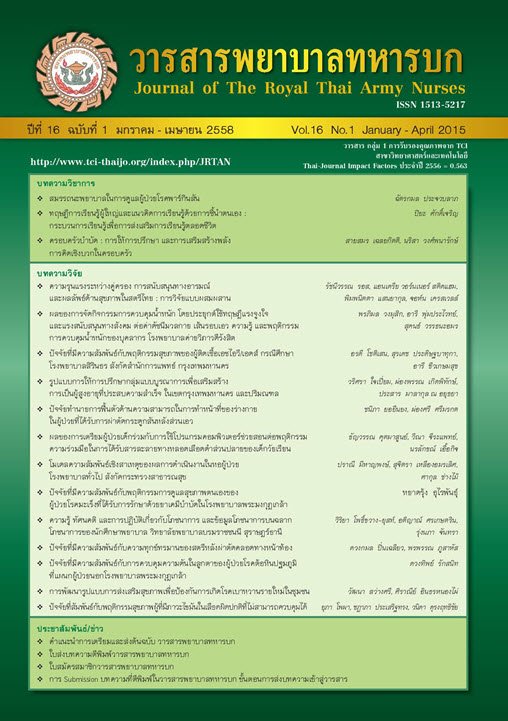Intimate Partner Violence, Emotional Support and Health Outcomes among Thai Women: A Mixed Methods Study ความรุนแรงระหว่างคู่ครอง การสนับสนุนทางอารมณ์ และผลลัพธ์ด้านสุขภาพในสตรีไทย: การวิจัยแบบผสมผสาน
Keywords:
violence, emotional support, depression, physical symptoms, quality of life, mediator, structural equation modeling, convergent mixed methods, ความรุนแรง, การสนับสนุนทางอารมณ์, ภาวะซึมเศร้า, อาการทางกายภาพ, คุณภาพชีวิต, ตัวแปรสื่อกลาง, สถิติโมเดลสมการAbstract
This convergent mixed methods examined: 1) predictors of IPV; 2) the association between IPV and health outcomes; 3) emotional support as a mediator between IPV and health outcomes and 4) IPV experiences in the Thai context. Structured questionnaires and open-ended questions were used to collect data in 2010 among female patients at a hospital in Thailand. Quantitative data were analyzed using structural equation modeling with AMOS version 21.0. Qualitative data were analyzed by conventional qualitative data analysis. Results showed that predictors of IPV included family income, spousal drug use, spousal alcohol use, and spousal gambling behavior. IPV was associated with depression, physical symptoms, and the quality of life. Emotional support weakly mediated between IPV and health outcomes. Qualitative results captured antecedents of IPV, reasons for disclosure or nondisclosure of IPV, how emotional support
mediated between IPV and health outcomes, recommendations for support needed to stop or deal with IPV, and plans if IPV continues. Findings from this study point to the need for routine screening for IPV among female patients and for a national campaign against IPV in Thailand.
การวิจัยแบบผสมผสานสามเส้าด้วยวิธีลู่เข้า (convergent mixed methods) โดยมีการวิจัยเชิงคุณภาพฝังอยู่ในงานวิจัยเชิงปริมาณ ในรูปแบบวิจัยคู่ขนานครั้งนี้มีวัตถุประสงค์เพื่อ 1) หาตัวทำนายความรุนแรงระหว่างคู่ครอง 2) หาความสัมพันธ์ระหว่างความรุนแรงระหว่างคู่ครองกับผลลัพธ์ด้านสุขภาพ 3) ศึกษาการสนับสนุนทางอารมณ์ซึ่งเป็นตัวแปรสื่อ (Mediator) ระหว่างความรุนแรงในครอบครัวและผลลัพธ์ด้านสุขภาพ และ 4) ศึกษาประสบการณ์ความรุนแรงระหว่างคู่ครองในบริบทของไทยโดยใช้แบบสอบถามแบบมีโครงสร้าง และคำถามปลายเปิดในการเก็บข้อมูลจากกลุ่มตัวอย่างซึ่งเป็นผู้ป่วยสตรีที่มารับบริการ ณ โรงพยาบาลมหาวิทยาลัยในประเทศไทย ช่วงปี 2553 วิเคราะห์ข้อมูลเชิงปริมาณด้วยสถิติโมเดลสมการโครงสร้าง AMOS รุ่น 21.0 ส่วนข้อมูลเชิงคุณภาพวิเคราะห์โดยการวิเคราะห์เนื้อหา (Conventional conten analysis)ผลการวิจัยพบว่า รายได้ของครอบครัว การใช้สารเสพติด การดื่มสุรา และการเล่นการพนันของสามี เป็นตัวทำนายการเกิดความรุนแรงระหว่างคู่ครอง ความรุนแรงระหว่างคู่ครองมีความสัมพันธ์กับภาวะซึมเศร้า อาการทางกายภาพ และคุณภาพชีวิตการสนับสนุนทางอารมณ์เป็นตัวแปรสื่อกลางระหว่างความรุนแรงระหว่างคู่ครองกับผลลัพธ์ด้านสุขภาพ ข้อมูลเชิงคุณภาพแสดงให้เห็นถึงสาเหตุของการเปิดเผยหรือไม่เปิดเผยการมีความรุนแรงในครอบครัว ผลการศึกษาชี้ให้เห็นว่าการตรวจคัดกรองความรุนแรงในครอบครัวให้แก่ผู้ป่วยสตรีมีความจำเป็น และควรกำหนดให้เป็นวาระแห่งชาติในการต่อต้านความรุนแรงต่อสตรีในประเทศไทยต่อไป
Downloads
Downloads
How to Cite
Issue
Section
License
บทความหรือข้อคิดเห็นใดใดที่ปรากฏในวารสารพยาบาลทหารบกเป็นวรรณกรรมของผู้เขียน ซึ่งบรรณาธิการหรือสมาคมพยาบาลทหารบก ไม่จำเป็นต้องเห็นด้วย
บทความที่ได้รับการตีพิมพ์เป็นลิขสิทธิ์ของวารสารพยาบาลทหารบก
The ideas and opinions expressed in the Journal of The Royal Thai Army Nurses are those of the authors and not necessarily those
of the editor or Royal Thai Army Nurses Association.






